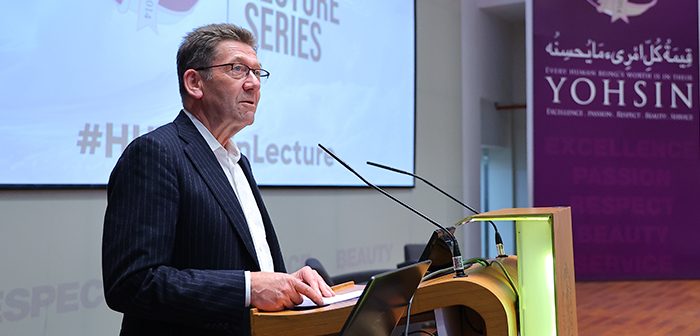On November 26th 2024, Habib University hosted the 9th edition of its flagship Yohsin Lecture Series, featuring the distinguished scholar and author Dr. Thomas Blom Hansen, Reliance-Dhirubhai Ambani Professor of Anthropology at Stanford University. Widely renowned for his research on Hindu nationalism, Hindu-Muslim conflicts, and urban politics in India, Dr. Thomas Hansen delivered a lecture titled “The Angry Tide: Reflections on Fascism, Resentment, and Authoritarian Dreams.”
Dr. Hansen explored the historical evolution of authoritarian ideologies, tracing their roots in the early 20th century to their resurgence in contemporary global and South Asian politics. The event attracted a diverse audience of students, academics, international scholars, and others eager to engage with these critical and timely issues.
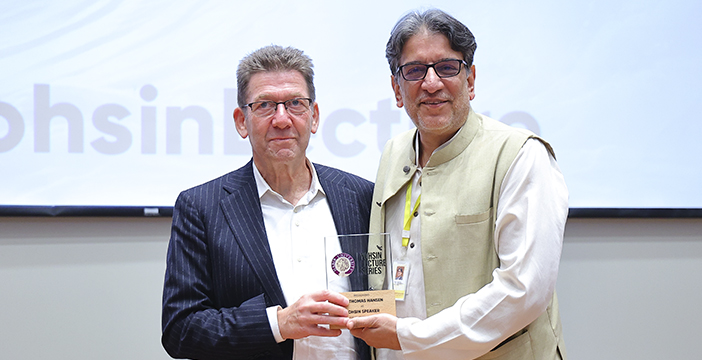
The Yohsin Lecture Series: Cultivating Thoughtful Conversations
The Yohsin Lecture Series embodies the University’s motto of Yohsin—thoughtful self-cultivation. By inviting thought leaders whose work has a wide-ranging impact, the series provides a platform for students, academics, and the wider community to engage with complex global challenges through new perspectives.
Over the years, the series has featured prominent speakers, including Noam Chomsky, a globally renowned linguist, philosopher, and social critic, and Dr. Azra Raza, a leading oncologist, bestselling author, and Director of the MDS Center at Columbia University amongst other prolific individuals. This year’s lecture continued the tradition by addressing a relevant political phenomenon that resonates globally, particularly relevant to South Asian socio-political contexts.
The Angry Tide: Dr. Thomas Hansen’s Talk on Fascism, Resentment, and Authoritarianism
The evening began with a warm welcome from Dr. Nauman Naqvi, Associate Professor of Comparative Humanities at Habib University, who introduced Dr. Hansen, along with other distinguished international scholars in attendance. These included Dr. Lynn Stein, Professor of Computer and Cognitive Science at the Olin College of Engineering and Habib University Board Member; Dr. Farina Mir, a historian of colonial and postcolonial South Asia, and professor at the University of Michigan Ann Arbor; and Dr. Bryan Penprase, Professor of Physics and Astronomy and Vice President at Soka University of America.
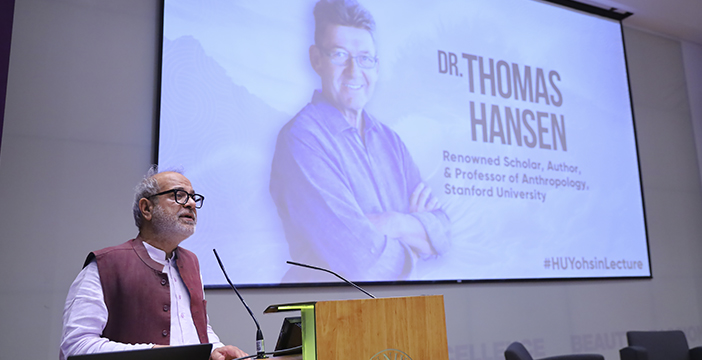
Speaking about Habib University’s commitment to excellence, Dr. Naqvi, remarked: “Habib University has begun its 11th academic year, a sign of our commitment to the motto of ‘Yohsin’. We continuously put ourselves under review for the sake of excellence, which Yohsin is all about.”
This year’s lecture, followed by a conversation with Dr. Naqvi and a Q&A session addressed the growing political polarization worldwide, making it particularly relevant to today’s global challenges. Dr. Hansen highlighted how right-wing populist leaders across the world have risen by pushing back against globalization, democracy, and diversity.
He noted, “Right-wing populist movements have gained momentum by pushing back against the effects of globalization, liberal democracy, multiculturalism, the increased visibility of women in public life, and against the recognition of racial, ethnic, and sexual identities and minorities across the world.” He explained how this has resulted in societal resentment and authoritarian reaction which belongs to a broader history of resisting freedom and equality.
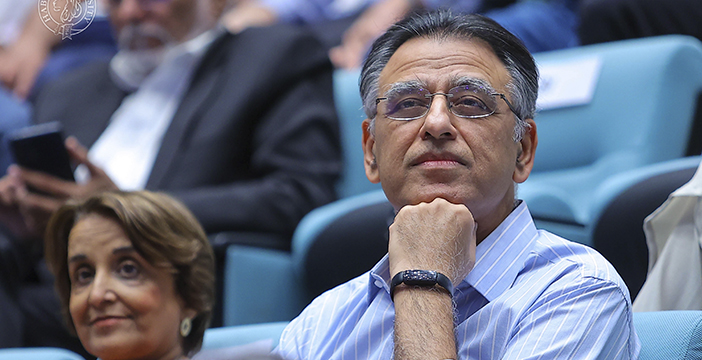
He focused on two main forms of 20th-century authoritarianism: the rise of fascism in Italy and Germany and the national-conservative integralism seen in Franco’s Spain, Portugal, Latin America, and parts of Asia, including Japan. He argued that understanding the similarities and differences between these movements can provide a better understanding of the current resurgence of authoritarianism and fascist ideologies.
He further explained: “In my view, fascism is just one manifestation, albeit a particularly violent one, of a broader range of conservative and nationalist movements that have opposed liberal freedom, democracy, and principles of equality, but also affect global capitalism, for more than a century.”
Contextualizing Global Challenges within South Asia
Dr. Thomas Hansen connected his analysis to South Asia, discussing the rise of Hindu nationalism and other identity-based movements. Drawing from his extensive research on urban politics in India and cultural memory in post-apartheid South Africa, he analyzed how the region’s history of cultural and political tensions continues to shape its present.
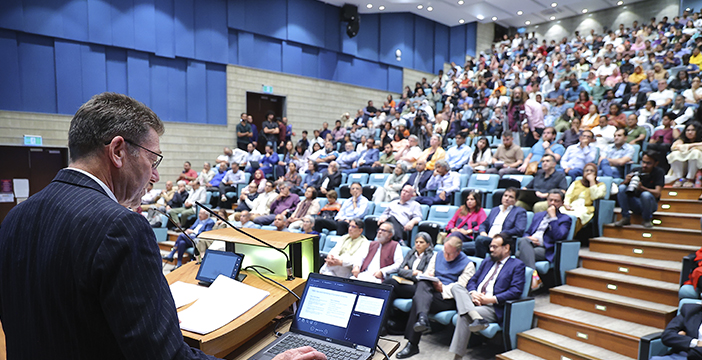
While exploring these ideologies, Dr. Thomas Hansen explained how economic anxieties, cultural insecurities and disillusionment with traditional political systems drive modern right-wing populism. His lecture emphasized the importance of learning from the past to protect pluralistic values.
Dr. Hansen’s insights were supported by his extensive academic contributions, including works such as ‘The Saffron Wave: Democracy and Hindu Nationalism in Modern India (1999)’, ‘Wages of Violence (2001)’, and ‘The Law of Force: The Violent Heart of Indian Politics (2021)’. His ability to make connections between the past and the present presented the audience with a clearer understanding of the fragility of democratic values in the face of growing authoritarianism, particularly in the context of South Asia.
Empowering Minds for Global Change
As the best university in Pakistan for liberal arts and sciences, Habib University’s contextualized education empowers students to engage with global challenges. The 9th Yohsin Lecture continued this tradition of connecting global issues with local perspectives, providing the audience with a deeper, more comprehensive understanding of the world.
For more information about the event, visit Yohsin Lecture Series 2024.

